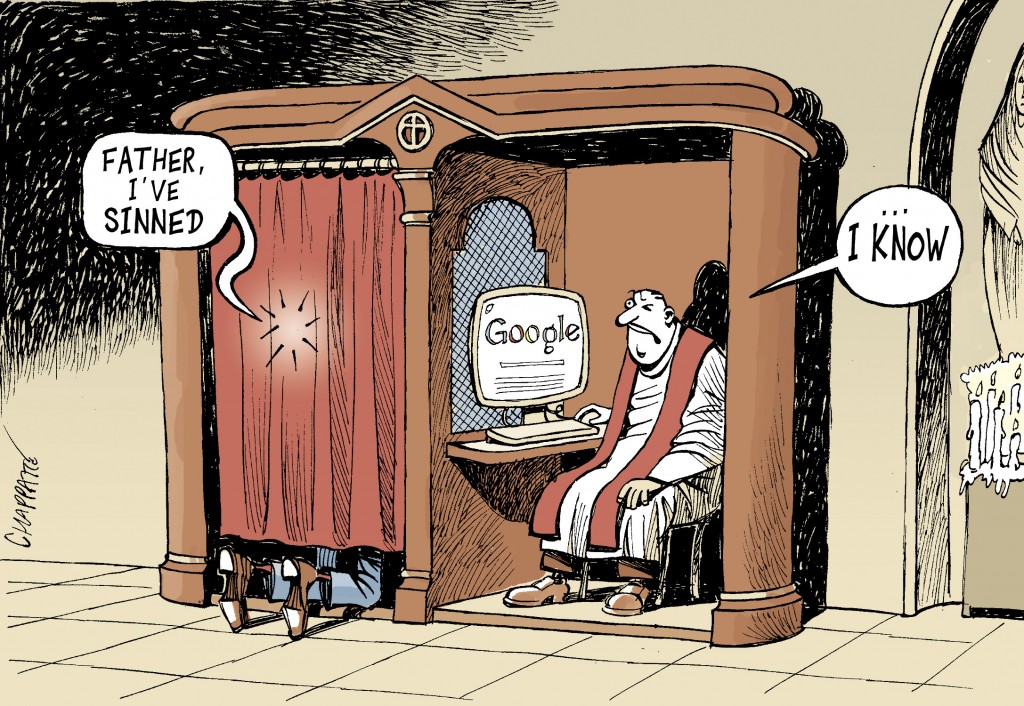Dear Brothers and Sisters in Christ,
 For most of us, there is nothing more intimidating than a chalkboard covered with math equations. But what looks to most of us like an unfathomable jumble of signs and symbols can be to a mathematician a thing of great beauty. For those who understand, a well-crafted equation has the elegance and symmetry of a classic poem or a great work of music.
For most of us, there is nothing more intimidating than a chalkboard covered with math equations. But what looks to most of us like an unfathomable jumble of signs and symbols can be to a mathematician a thing of great beauty. For those who understand, a well-crafted equation has the elegance and symmetry of a classic poem or a great work of music.
 Numbers can indeed be fascinating. Let me show you what I mean by looking at the one mathematical symbol that we probably all recognize—the Greek letter ∏. We learned in elementary school to call this symbol Pi.
Numbers can indeed be fascinating. Let me show you what I mean by looking at the one mathematical symbol that we probably all recognize—the Greek letter ∏. We learned in elementary school to call this symbol Pi.
Pi is used to represent the relationship between the circumference and diameter of a circle. It’s the answer to the question: What is the size/ratio of the circumference of a circle to the length of its diameter? Pi is an irrational number, which means that it cannot be expressed exactly as a simple fraction. In fact, it can’t be expressed exactly at all—it is what is known as a non-repeating decimal.
For centuries, mathematicians have tried to calculate a more precise value of Pi. Here it is to 100 decimal places: 3.1415926535 8979323846 2643383279 5028841971 6939937510 5820974944 5923078164 0628620899 8628034825 3421170679. Though mathematicians have calculated Pi to 10 trillion places, they have found no discernible, repeating patterns. Because of this anomaly, contained in Pi are all of the number series sequences found in all of life. In Pi you will find your telephone number, your social security number, your birth-date, your marriage date and the date of your death and more! However, this anomaly does not make Pi unusable—expressing it as the imprecise fraction 22/7 is still good enough for most practical purposes.
Even if the field of higher mathematics is alien territory for most of us, I think we can see why those who have studied it find a beauty, and even spiritual inspiration there. Astronomer Johannes Kepler said, “Geometry is one and eternal shining in the mind of God. That share in it accorded to men is one of the reasons that man is the image of God.” Gottfried Wilhelm Leibniz said, “The pleasure we obtain from music comes from counting, but counting unconsciously. Music is nothing but unconscious arithmetic.”
Sir Isaac Newton said, “God created everything by number, weight and measure.” Euclid observed how, “the laws of nature are but the mathematical thoughts of God.” Galileo Galilei noted that, “mathematics is the alphabet with which God has written the universe.” And Einstein said, “God does not care about our mathematical difficulties. He integrates empirically.” Like particle physicists working on the cutting edges of discovery, mathematicians are finding it necessary to express their conclusions in language sounding more metaphysical than strictly scientific. The distinguished mathematician Paul Albert Gordan (1837–1912) anticipated this when he wrote, “This [axiomatic math] is no longer mathematics, it is theology.”
Of course, God is the greatest mathematician. He can count the birds that fall from the sky, the number of hairs on our heads and even remember the number of tears we have shed. Paul reminds us how we can understand something about God from looking at his creation. And of course, the best look that we have at what God is like is in the person of Jesus Christ.
Jesus came to be one of us and revealed the Father and the Holy Spirit. From this, the church formulated the doctrine of God’s Trinitarian nature. Understanding God as a Trinity does not exhaustively explain everything, but it does encapsulate essentially what we need to know and possibly can know. You could say that the doctrine of the Trinity “explains” God like 22/7 expresses Pi as a fraction. We can’t get to the last decimal of Pi and we can’t explain everything about the truth, reality and being of God. But knowing God as Father, Son and Holy Spirit is complete and accurate enough to allow us to grasp the true nature of God in our everyday lives and to join in a full relationship with him. A real relationship with God, when lived through Jesus Christ, does not require, first, a comprehensive understanding. Our understanding follows our being in a reconciled relationship to God through Jesus Christ—who does have a comprehensive understanding of God and shares with us all of what we can fathom.
It would be foolish and arrogant for mere mortals to claim we can ever thoroughly explain everything there is to know about God. He is so much greater than we are, having thoughts that are not our thoughts and ways that are so much higher than ours (see Isaiah 55:8). His unreserved compassion, endless mercy and unconditional love make no sense to our human ways of reasoning. As Paul wrote in his epistle to the Romans, “Have you ever come on anything quite like this extravagant generosity of God, this deep, deep wisdom? It’s way over our heads. We’ll never figure it out” (Romans 11:33, The Message).
Moses summed it up well in Deuteronomy 29:29: “The secret things belong to the LORD our God, but the things revealed belong to us and to our children forever, that we may follow all the words of this law.” Because of Jesus, we know so much more than ancient Israel could have known. But let’s always remember that in our understanding we still “see through a glass darkly,” even while we are in fact enjoying a real and right relationship with God through Christ and by the Spirit.
One day, it will all become clear. Until then, I find it fascinating to look over the shoulders of mathematicians and scientists as they probe ever deeper into the mysteries of the cosmos—especially those who have the humility at the end of the day to say, “How great thou art.”
With love in Christ’s service,
Joseph Tkach


 Al Nelson, the pastor of GCI’s church in Montpelier, Vermont, says that he feels close to God when he does something he knows he could not have done on his own, “like being a pastor.” “My feeling close to God does not come and go with daily events or where I am at any given time. It is more like a continuum. As my knowledge of God increases I feel closer and closer to him. I feel closer to God now than at any time in my life.”
Al Nelson, the pastor of GCI’s church in Montpelier, Vermont, says that he feels close to God when he does something he knows he could not have done on his own, “like being a pastor.” “My feeling close to God does not come and go with daily events or where I am at any given time. It is more like a continuum. As my knowledge of God increases I feel closer and closer to him. I feel closer to God now than at any time in my life.”
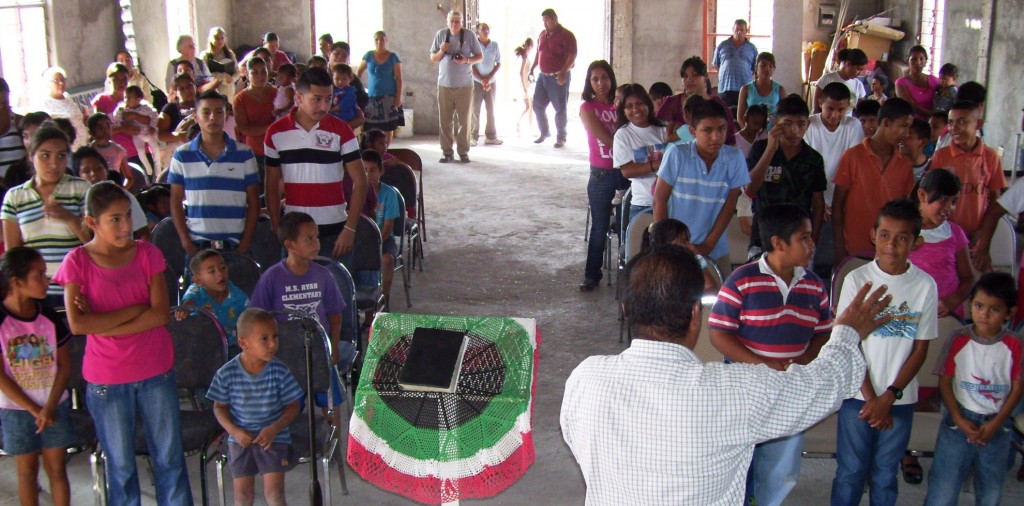
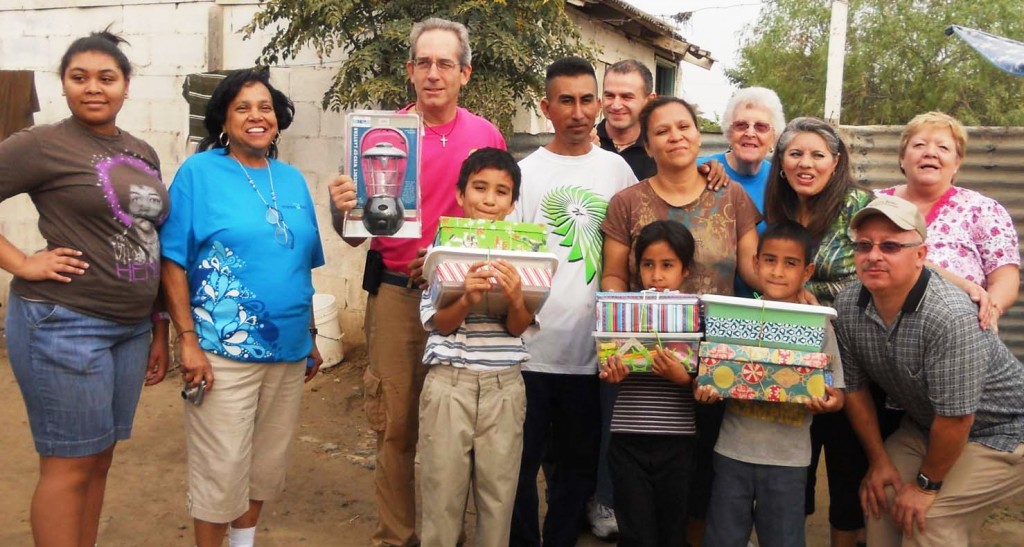
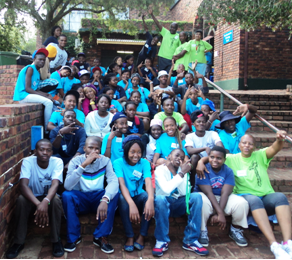 Wendy and I recently visited South Africa where we served at the South African national youth camp near Johannesburg. There were 205 people at the camp, including about 160 youth. GCI Canada provided scholarships for about 40 of the campers (pictured at right) from GCI congregations in Moruleng (the “tent church”) and Zeerust (an area on the verge of birthing a new congregation). These areas are depressed economically, so the scholarships were a huge blessing.
Wendy and I recently visited South Africa where we served at the South African national youth camp near Johannesburg. There were 205 people at the camp, including about 160 youth. GCI Canada provided scholarships for about 40 of the campers (pictured at right) from GCI congregations in Moruleng (the “tent church”) and Zeerust (an area on the verge of birthing a new congregation). These areas are depressed economically, so the scholarships were a huge blessing.

 Recently, my wife Ruth and I visited Qiloe for their annual family festival. It was quite a trip, with a 3½ hour flight followed by a couple of boat rides (with beautiful views like that shown at left). We were accompanied by Henry and Elisabeth Kuper. Henry is our national coordinating pastor for the Solomon’s. He retired from the Solomon’s National Police Force some years ago, and served for a time as aide-de-camp to the Governor General.
Recently, my wife Ruth and I visited Qiloe for their annual family festival. It was quite a trip, with a 3½ hour flight followed by a couple of boat rides (with beautiful views like that shown at left). We were accompanied by Henry and Elisabeth Kuper. Henry is our national coordinating pastor for the Solomon’s. He retired from the Solomon’s National Police Force some years ago, and served for a time as aide-de-camp to the Governor General.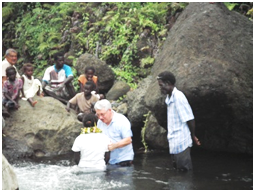 I had gone to Ranongga anticipating one baptism but found on arriving that there were three other young people waiting for baptism too. We had to walk about 20 minutes through thick tropical vegetation to reach a clear stream coming out of the hills that had a pool deep enough for the baptisms. On arrival I discovered that some ladies had preceded us and built a small wall of stones across the stream to deepen the pool. It was an inspiring natural location to witness their public acceptance of Christ as Savior and Lord and to celebrate their part in the Body of Christ.
I had gone to Ranongga anticipating one baptism but found on arriving that there were three other young people waiting for baptism too. We had to walk about 20 minutes through thick tropical vegetation to reach a clear stream coming out of the hills that had a pool deep enough for the baptisms. On arrival I discovered that some ladies had preceded us and built a small wall of stones across the stream to deepen the pool. It was an inspiring natural location to witness their public acceptance of Christ as Savior and Lord and to celebrate their part in the Body of Christ.
